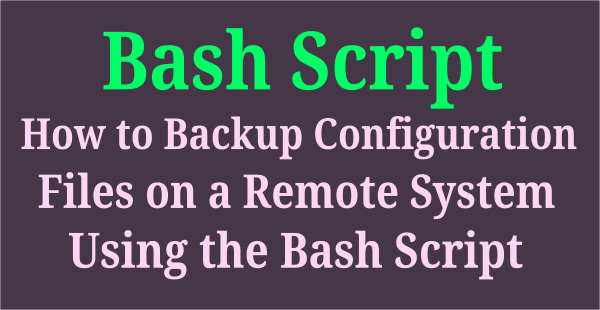Some time ago, we wrote an article to record the Linux terminal session activity using the script command.
Today also, we are going to discuss the same topic.
But this tutorial allows you to automatically record the terminal session activity of all users.
I advise administrators to include this functionality as part of a security checklist on the mission critical server.
This will help you to fix the problem immediately if something goes wrong with the server by any user activity.
You can easily identify what he/she did by checking the specific user’s session activity file.
Also, it can help you get the command output whenever you want, or you can keep it for future reference.
By default everyone prefers the history command to review the previously entered commands in the terminal. Yes, it is good, but unfortunately it doesn’t show the output of previously executed commands.
This can be done using the script command. To do so, add the following script to the /etc/profile file. It will automatically start recording the user’s terminal session whenever the user logs in.
What is script Command
Script is a UNIX command-line application that records a terminal session (in other words, it records everything that is displayed on your terminal).
It stores the output as text file in the current directory and the default filename is typescript.
What is scriptreplay
This program replays a typescript, using timing information to ensure that output happens at the same speed as it originally appeared when the script was recorded.
How to Check if the script Command is Installed or not on Linux
The script is part of the Linux Core application and is already installed on most Linux distributions by default.
The script command is part of the “util-linux-ng” package on RHEL-based systems and the “bsdutils” package on Debian-based systems.
For RHEL based systems, use the rpm command
# rpm -qf /usr/bin/script util-linux-2.32.1-8.el8.x86_64 # rpm -qf /usr/bin/scriptreplay util-linux-2.32.1-8.el8.x86_64
For Debian based systems, use the dpkg command
# dpkg -S /usr/bin/script bsdutils: /usr/bin/script # dpkg -S /usr/bin/scriptreplay bsdutils: /usr/bin/scriptreplay
What is /etc/profile file? And What’s their Use on Linux
The /etc/profile file used to set global Linux system environment variables to the user’s shell. This file will be executed automatically whenever user enter the bash shell login. Open the “/etc/profile” file using your favorite text editor and add the code below.
# vi /etc/profile
#Script to Record the User's Terminal Session
if [ "x$session_record" = "x" ]
then
timestamp=`date "+%m%d%Y%H%M"`
output=/var/log/session/session.$USER.$$.$timestamp
session_record=started
export session_record
script -t -f -q 2>${output}.timing $output
exit
fi
Make sure that the output path /var/log/session directory already exists on the system. If not, create it.
# mkdir /var/log/session
Change the /var/log/session directory permission to 777, which allows all users to write their session activity in the session directory. To learn more about Linux file permissions go to the following article.
# chmod 777 /var/log/session
How to Check if this Script Works as Expected?
All the prerequisites are done, we will run some commands in the terminal to check this experiment.
Let’s imagine that you have three users: daygeek, magi, and tanisha. We will run some commands in each session to verify this test.
We run the following commands as daygeek user.
$ uname -a $ arch $ hostname -I $ exit
We run the following commands as magi user.
$ w $ date $ whoami $ cat /etc/centos-release $ exit
We run the following commands as tanisha user.
$ rpm -q kernel $ history $ last reboot $ exit
We run the following commands as root user.
# whoami # pwd # host 2daygeek.com # host magesh.co.in # exit
How to List Recorded Sessions on Linux Using the script Command
We have successfully executed some commands from all users session. Use the ls command to view recorded sessions (ls stands for list directory contents).
# ls -lh /var/log/session total 32K -rw-rw-r-- 1 daygeek daygeek 2.0K Jul 24 17:16 session.daygeek.26452.072420191715 -rw-rw-r-- 1 daygeek daygeek 784 Jul 24 17:16 session.daygeek.26452.072420191715.timing -rw-rw-r-- 1 magi magi 835 Jul 24 17:14 session.magi.26394.072420191713 -rw-rw-r-- 1 magi magi 591 Jul 24 17:14 session.magi.26394.072420191713.timing -rw-r--r-- 1 root root 957 Jul 24 17:18 session.root.26499.072420191717 -rw-r--r-- 1 root root 864 Jul 24 17:18 session.root.26499.072420191717.timing -rw-rw-r-- 1 tanisha tanisha 555 Jul 24 17:20 session.tanisha.26545.072420191718 -rw-rw-r-- 1 tanisha tanisha 528 Jul 24 17:20 session.tanisha.26545.072420191718.timing
Yes, all user’s terminal session operations are successfully registered and it was stored under the /var/log/session directory.
How to View Recorded Sessions on Linux Using the script Command
I can say that everything went as expected without any problems, because it created all the users’ files.
Now, it’s time to look at all of the user’s recorded session data, one by one, to make sure the script captures everything we’ve implemented.
Find the daygeek user’s session output.
# more session.daygeek.26452.072420191715 Script started on Mon 24 Jul 2019 05:15:13 PM EDT [daygeek@vps1 ~]$ uname -a Linux vps1.daygeek.com 2.6.32-754.el6.x86_64 #1 SMP Tue Jun 19 21:26:04 UTC 2018 x86_64 x86_64 x86_64 GNU/Linux [daygeek@vps1 ~]$ arch x86_64 [daygeek@vps1 ~]$ hostname -I 66.70.189.137 [daygeek@vps1 ~]$ exit exit
Find the magi user’s session output.
# more session.magi.26394.072420191713 Script started on Mon 24 Jul 2019 05:13:10 PM EDT [magi@vps1 ~]$ w 17:13:13 up 3 days, 7:17, 4 users, load average: 0.00, 0.00, 0.00 USER TTY FROM LOGIN@ IDLE JCPU PCPU WHAT root pts/0 103.5.134.167 17:00 4:13 0.29s 0.24s top -c root pts/1 103.5.134.167 17:09 27.00s 0.01s 0.01s -bash magi pts/2 103.5.134.167 17:13 0.00s 0.00s 0.00s -bash magi pts/3 - 17:13 0.00s 0.00s 0.00s w [magi@vps1 ~]$ date Mon Jul 24 17:13:24 EDT 2019 [magi@vps1 ~]$ whoami magi [magi@vps1 ~]$ cat /etc/centos-release CentOS release 6.10 (Final) [magi@vps1 ~]$ exit exit
Find the tanisha user’s session output.
# more session.tanisha.26545.072420191718 Script started on Mon 24 Jul 2019 05:18:49 PM EDT [tanisha@vps1 ~]$ rpm -q kernel kernel-2.6.32-754.el6.x86_64 [tanisha@vps1 ~]$ history 1 rpm -q kernel 2 history [tanisha@vps1 ~]$ last reboot reboot system boot 2.6.32-696.6.3.e Fri Jul 21 09:55 - 17:20 (3+07:24) wtmp begins Fri Jul 21 09:54:02 2019 [tanisha@vps1 ~]$ exit exit
Find the root user’s session output.
# more session.root.26499.072420191717 Script started on Mon 24 Jul 2019 05:17:41 PM EDT [root@vps1 ~]# whoami root [root@vps1 ~]# pwd /root [root@vps1 ~]# host 2daygeek.com 2daygeek.com has address 104.27.157.177 2daygeek.com has address 104.27.156.177 2daygeek.com has IPv6 address 2400:cb00:2048:1::681b:9db1 2daygeek.com has IPv6 address 2400:cb00:2048:1::681b:9cb1 2daygeek.com mail is handled by 0 dc-7dba4d3ea8cd.2daygeek.com. [root@vps1 ~]# host magesh.co.in magesh.co.in has address 103.212.204.46 magesh.co.in mail is handled by 10 e46f668a62df45920a71fc97ebe479.pamx1.hotmail.com. [root@vps1 ~]# exit exit
All of the above output clearly show that everything is recorded without any problems.
How to Replay the Session Recorded Through scriptreplay Command
You can replay the recorded session with help of the scriptreplay command since the script has captured the timing file as well. To do so, run the file as mentioned below.
# scriptreplay --timing=session.daygeek.26452.072420191715.timing session.daygeek.26452.072420191715




do we need to create file under /etc/profile.d for rhel
You need to add the script under /etc/profile and don’t need to create any file under /etc/profile.d.
This user monitor terminal record script after putting in /etc/profile, Will it effect users .bash_profile
Yes, it works.
I wrote pypty, which is basically script(1) in Python. The chief advantage is that it supports a “dated files mode”, so if you leave a tty open overnight, a new file will be started named by the current date. The distribution also includes script-replay, which allows you to view logs from pypty or script(1), and allows you to move forward and backward through time. It’s at http://stromberg.dnsalias.org/~strombrg/pypty/
For control freaks world over.
Can i use your how to on my up coming website?
Great thank you so much.
Little bit busy with server migration.
Did you enabled the sudo access on the server ?
If so, disable sudo access and enable the root user login on /etc/ssh/ssh_config and try to access.
Did you trying to access ftp,sftp or ssh protocol ?
If ftp or sftp, make sure your server having ftp service.
Also allow the port on your windows PC firewall.
If you still getting the issue, pls send your server username and its password to magi.m7002@gmail.com check further.
Rsync to server with this script wont send a file. I type rsync -avz test.test root@x.x.x.x and password and nothing work. File is still on server without script, but i cannot send file to server with script.
can you post the winscp screen shot error.
http://images61.fotosik.pl/978/bb7ecaf12a015b8a.jpg
and
http://images63.fotosik.pl/979/a1c1b8f25267c9f4.jpg
Maybe you known how disable script when I log by WinScp ? I try in /etc/profile filter like if [bash -c /usr/lib64/ssh/sftp-server] but this dont work
Log from server when i try copy file by scp
tail -f /var/log/messages
May 15 09:45:49 bash[2699]: — root : vi /etc/profile
May 15 09:45:49 snoopy[2700]: [uid:0 sid:32046 tty:/dev/pts/9 cwd:/home/download/ttyrec-1.0.8 filename:/usr/bin/tail]: tail -f /var/log/messages
May 15 09:45:54 snoopy[2701]: [uid:0 sid:2701 tty: cwd:/ filename:/usr/sbin/sshd]: /usr/sbin/sshd -o PidFile=/var/run/sshd.init.pid -R
May 15 09:45:57 sshd[2701]: Accepted keyboard-interactive/pam for root from x.x.x.x port 59385 ssh2
May 15 09:45:57 sshd[2701]: subsystem request for sftp by user root
May 15 09:45:57 snoopy[2704]: [uid:0 sid:2704 tty: cwd:/root filename:/bin/bash]: bash -c /usr/lib64/ssh/sftp-server
May 15 09:45:57 snoopy[2706]: [uid:0 sid:2704 tty: cwd:/root filename:/usr/bin/readlink]: readlink /proc/2704/exe
May 15 09:45:57 snoopy[2708]: [uid:0 sid:2704 tty: cwd:/root filename:/usr/bin/dircolors]: /usr/bin/dircolors -b /etc/DIR_COLORS
May 15 09:45:57 snoopy[2710]: [uid:0 sid:2704 tty: cwd:/root filename:/usr/bin/readlink]: readlink /proc/2704/exe
May 15 09:45:57 snoopy[2712]: [uid:0 sid:2704 tty: cwd:/root filename:/usr/bin/tty]: /usr/bin/tty
May 15 09:45:57 snoopy[3007]: [uid:0 sid:2704 tty: cwd:/root filename:/usr/bin/sed]: sed -r s@/*:|([^\\]):@\1\n@g;H;x;s@/\n@\n@
May 15 09:45:57 snoopy[3011]: [uid:0 sid:2704 tty: cwd:/root filename:/usr/bin/sed]: sed -r s@/*:|([^\\]):@\1\n@g;H;x;s@/\n@\n@
May 15 09:45:57 snoopy[3013]: [uid:0 sid:2704 tty: cwd:/root filename:/bin/logger]: logger -p local1.notice -t bash -i — root :
May 15 09:45:57 snoopy[3053]: [uid:0 sid:2704 tty: cwd:/root filename:/bin/date]: date +%d_%m_%Y_%H:%M_%N
May 15 09:45:57 snoopy[3055]: [uid:0 sid:2704 tty: cwd:/root filename:/bin/logger]: logger -p local1.notice -t bash -i — root :
May 15 09:45:57 bash[3055]: — root :
May 15 09:45:57 snoopy[3056]: [uid:0 sid:2704 tty: cwd:/root filename:/usr/bin/touch]: touch /var/log/session/session.root.15_05_2014_09:45_595481911
May 15 09:45:57 bash[3064]: — root :
May 15 09:45:57 snoopy[3065]: [uid:0 sid:2704 tty: cwd:/root filename:/usr/bin/script]: script -t -f -q /var/log/session/session.root.15_05_2014_09:45_595481911
May 15 09:45:57 snoopy[3069]: [uid:0 sid:3067 tty:/dev/pts/23 cwd:/root filename:/usr/bin/readlink]: readlink /proc/3067/exe
May 15 09:45:57 snoopy[3071]: [uid:0 sid:3067 tty:/dev/pts/23 cwd:/root filename:/usr/bin/dircolors]: /usr/bin/dircolors -b /etc/DIR_COLORS
May 15 09:45:57 snoopy[3074]: [uid:0 sid:3067 tty:/dev/pts/23 cwd:/root filename:/usr/bin/tput]: /usr/bin/tput bold
May 15 09:45:57 snoopy[3075]: [uid:0 sid:3067 tty:/dev/pts/23 cwd:/root filename:/usr/bin/tput]: /usr/bin/tput setaf 1
May 15 09:45:57 snoopy[3077]: [uid:0 sid:3067 tty:/dev/pts/23 cwd:/root filename:/usr/bin/tput]: /usr/bin/tput sgr0
How about connection by WinScp? I create in /etc/profile the same script and I cannot copy files to my server. I try scp and WinSCP.
Wt error you are getting, can you please post your error message here.
Try rsync command https://www.2daygeek.com/shell-script-for-remote-backup-using-rsync-command/
rsync to other server works smothly. I only cannot connect in WinScp. I must uploading files to server from Windows Client so WinScp I need.